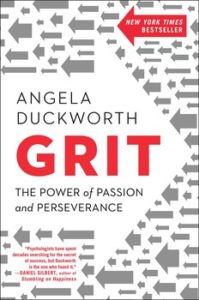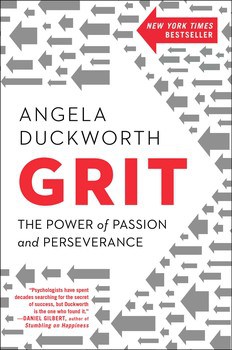Reviewed By: Kim Blackwell
 The Premise: In Grit: The Power of Passion and Perseverance, Angela Duckworth takes us through her research and findings that ‘grit’ is a greater predictor and contributor to success than talent or IQ, and that grit is something that can be learned. Defined as a unique combination of passion and long-term perseverance, she lays out compelling evidence as to why grit matters, along with suggestions for how we can develop grit in ourselves and in others. Throughout the book Duckworth shares learning and insights from the some of the high achievers that she has interviewed. And, also wrapped around it all, she shares her own personal story of the significance of grit in her life.
The Premise: In Grit: The Power of Passion and Perseverance, Angela Duckworth takes us through her research and findings that ‘grit’ is a greater predictor and contributor to success than talent or IQ, and that grit is something that can be learned. Defined as a unique combination of passion and long-term perseverance, she lays out compelling evidence as to why grit matters, along with suggestions for how we can develop grit in ourselves and in others. Throughout the book Duckworth shares learning and insights from the some of the high achievers that she has interviewed. And, also wrapped around it all, she shares her own personal story of the significance of grit in her life.
A key theory that Duckworth brings to bear around the importance of grit, is one that relates talent and effort to achievement. While she notes that both talent and effort are part of the equation for achievement, she also points out that effort counts twice in that equation. She suggests that talent is how quickly one develops a skill when effort is put into it (talent x effort = skill). And, that putting effort into a skill makes it more productive, thus leading to achievement (skill x effort = achievement). “Without effort, your talent is nothing more than your unmet potential. Without effort, your skill is nothing more than what you could have done but didn’t. With effort, talent becomes skill and, at the very same time, effort makes skill productive.”
Beyond effort and talent, Duckworth also explores the relationship between grit and goals. She point out that many of those individuals who demonstrate grit have remained very focused on one goal over an extended period of time, and that any other goals they may have are anchored to that one ‘top-level’ goal. “Grit is about holding the same top-level goal for a very long time. In very gritty people, most mid-level and low-level goals are, in some way or another, related to that ultimate goal. In contrast, a lack of grit can come from having less coherent goal structures.”
Duckworth’s goes on to share her studies showing that grit changes over time, thus demonstrating that this is something that we can grow from within. She outlines four key psychological assets that are consistent with grit, and explores the opportunity to build these assets. The first of these is interest, relating to doing what you enjoy doing and seeking out areas that fuel your passion. The next asset she explores is practice, the daily discipline of trying to do things better. Third is purpose, seeing your work as important not just to you, but to others. And finally, hope, the ability to keep going even when things are difficult or you are doubtful. She then wraps it up with some of the opportunities and strategies with which to develop grit in others.
The Bottom Line: This was a great read, full of fascinating insights and examples of how success emerges from that magical combination of passion and perseverance that Duckworth calls ‘grit’. It provides an opportunity to self-assess on a version of Duckworth’s Grit Scale; it provides some direction on how to increase your grit capacity, should you be motivated in that way; and it sets out realistic expectations around the dedicated effort and discipline that is required to do so. It is often said that “hard work pays off”. This book puts some affirmation, science and specificity behind that.
Recommendation: I would highly recommend this book to anyone striving for success in any facet of their life.




